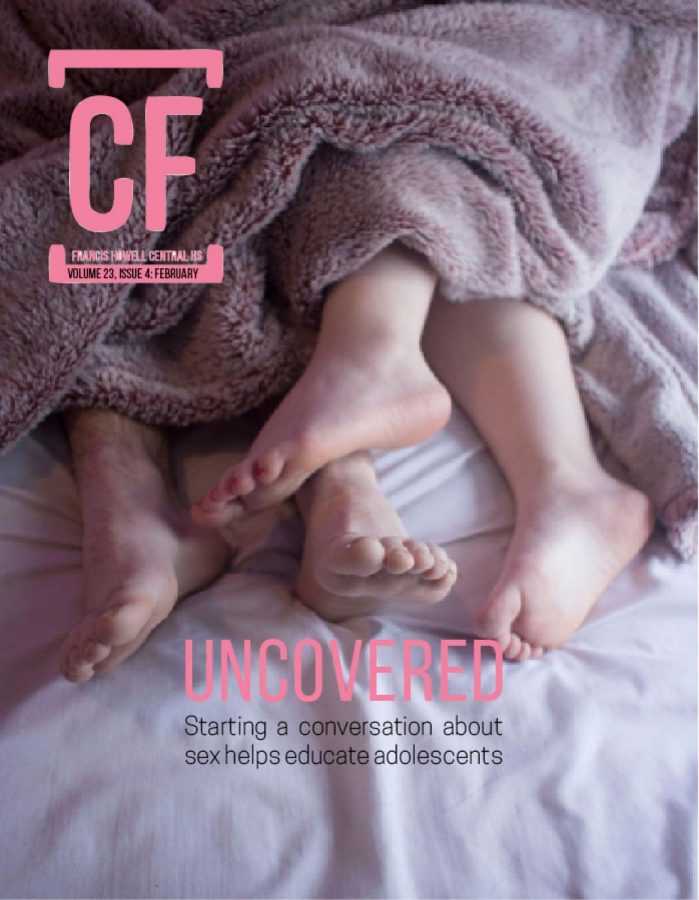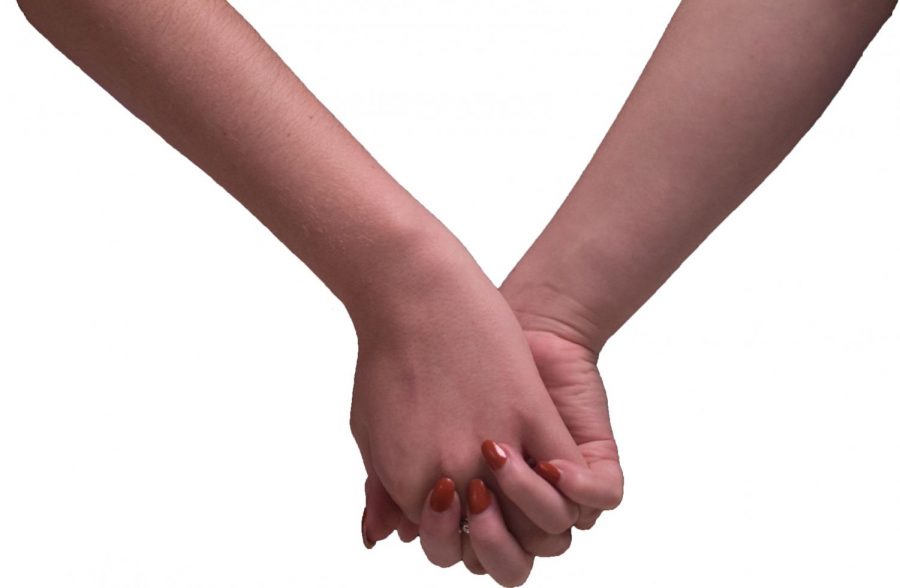Your donation will support the student journalists of Francis Howell Central High School. Your contribution will allow us to purchase equipment and cover our annual website hosting costs. FHCToday.com and our subsequent publications are dedicated to the students by the students. We hope you consider donating to allow us to continue our mission of a connected and well-informed student body.
Carelessly Covered: Covers are haphazardly strewn across a bed, with undergarments laying messily across it. Adolescents’ relationship with sex can be a messy one but with careful thought and reflection, teenagers can form a healthy relationship with sex.
Let’s Talk About Sex
Understanding motivations for leads to a healthy relationship with it
“I considered having sex because I had reached a point in my life where it was something I wanted to experience. I had an opportunity with someone I felt safe with and we decided that it was something we both wanted to do. I think that having sex at a younger age is something one should gauge on their level of readiness,” senior Eli Allen said. “And I personally felt ready.”
In high schools, sex happens. According to the Resource Center for Adolescent Pregnancy Prevention, 41 percent of high school students report having sexual intercourse. 41 percent of high schoolers may be sexually active, but all high schoolers have to set standards for themselves and decide what they do or don’t want to have in a relationship; which is why it is so important to discuss the topic at hand.
Why do some choose to remain abstinent while others have sex? Sophomore *Grace Brown isn’t quite sure why.
“I don’t really have an answer… it’s not like a simple thing, you know?,” Brown said.
Allen remarks why he became sexually active after his standards were reached by a significant other.
“I decided that if I was going to have [sex], I’d wait until [I found] somebody that I cared about.” Allen said. “I ended up being in a relationship that met the criteria that I set for myself.”
Licensed profesional counselor and certified sex therapist Lindsay Walden feels why some people have sex is because of a desire for connection.
“People want connection,” Walden said. “We are really wired for connection… or they’re seeking maybe a feeling of being loved or being cared for, a closeness that maybe they don’t feel like they can achieve in other ways.”
With such a large number of sexually active teenagers, it’s important to see why teens are having sex and to make sure that they are for the right reasons. Unfortunately, some teens have sex because they see it as a rite of passage, or because they feel pressured into it by friends, media or society.
According to a peer pressure and teen sex article from Psychology Today, 23 percent of teenage girls feel pressured into sex. This may be due to the societal standards we have set from the generations before us to fit in.
“Sex is not going to be the determining factor as to whether or not someone likes or accepts you, and you deserve to be accepted for who you are and you deserve to be appreciated and not treated like a commodity or a conquest.”
Although 23 percent of teenage girls feel pressured into sex, what may be surprising to most is the amount of teen males that feel pressured into sex.
According to the Psychology Today study, one in three teenage boys feel pressured into sex. Most of the time, this pressure is originating from their male friends. The atmosphere that men have created for themselves within their friend groups is causing toxic pressure to become “one of the boys.”
“When you see men that have lots of sex, they’re celebrated. You see guys giving high fives like, ‘Get anotha one!,” Allen said.
When being told by friends that sex will be celebrated, it affects how boys look at themselves. Junior Hunter Watson looks at himself differently after having sex.
“You experience something new and more grown-up so you feel more adult-ish and responsible,” Watson said.
This atmosphere is completely different for girls.
“In general, women are definitely judged more than men,” Brown said. “I feel like any way that you choose, [abstinent or sexually active], it’s going to be judged.”
Men at FHC have noticed women being called sluts or whores for having sex while their male counterparts are lifted and praised.
“We’re slut-shaming [and] it’s more uncomfortable for women to share their experiences or talk about it,” Watson said.
This can make it hard for women to talk about their experiences. Women have the hurdle of double standards to jump over when dealing with sex in society.
“There’s like this fake double standard with women. They get hate. They get looked at differently,” Watson said.
On the other hand, our generation is the generation of change. According to a National Health Statistics Report, the number of youth having sex at young ages is decreasing and the use of contraception is increasing, causing a decrease in teen pregnancy, according to the Resource Center for Adolescent Pregnancy Prevention. Perhaps a change in how women are perceived after having sex is changing too.
“I think any time there’s a change or a shift, It’s usually a slow process,” Walden said. “I think we’re seeing some shifting towards that but I think there’s a lot of societal messaging [getting in the way].”
Every teenager should know why they choose what they choose. Knowing why you remain abstinent will help you when facing those who may pressure you to stray from your morals. Knowing why you have sex will help make sure you are having sex for the right reasons and being safe along the way.
“I think it’s important for people going into a sexual activity or that might be seeking these types of connections is making sure that you’re seeking it for the right reasons,” Walden said.
*The use of asterisks indicates pseudonyms used to protect a source’s anonymity
Masturbation: It’s Uni-sex
Individual sexual activity is normal for both genders
As junior Harlie Mills sat on her bed engaging in conversation, her friend, quite nervously and timidly, brought up the topic of masturbation. A subject discussed countless times by her male peers, sometimes juvenile and often jocular, was the same one her companion was so nervous to speak about. While Mills was caught off guard, as masturbation was something she had never discussed with another person, she was quick to assure the girl sitting beside her of the normality of her behavior.
For junior *Caleb Edwards, interactions involving masturbation have been very different. His friends talk about it often, and the conversations tend to be casual and light-hearted. He’s never dealt with fear of being judged and his own attitude about masturbation is quite relaxed.
Among young men and women, there’s a disparity in the perceptions of masturbation. Female masturbation is often seen as an incredibly private, and even shameful activity. It’s not commonly regarded as a light topic of discussion, and it’s not commonly discussed in the first place. The nature of boys’ conversations about masturbation, laid-back and nonchalant, parallels the attitude towards male masturbation had by many; it’s extraordinarily normal and incredibly common.
According to Lindsay Walden, a certified sex therapist who has been in practice for more than 12 years, there are many misconceptions surrounding masturbation, which tend to perpetuate the stigma faced by people who masturbate.
“Masturbation is not wrong or dirty, and it is a way for a person to learn about themselves in a sexual way without feeling that they have to engage in partnered activity,” Walden said. “I truly believe that sexual self knowledge is a basic human right, and I wish there was not a stigma associated with exploring it.“
Walden adds while this stigma may affect anyone who masturbates, it is particularly intense when it comes to women.
“There is a stigma that often says it’s okay for men to explore themselves sexually, but our society often sends a message that it’s not okay for women to do the same thing,” Walden said.
From Mills’ perspective, the shame surrounding masturbation is something many women face, and she sees a big difference in how men and women are viewed for engaging in the same activity.
“I think for guys, it’s [seen as] more… normal than for girls and I feel like people will kind of put down girls if they do it,” Mills said “I feel like more guys kinda come after girls with that stuff trying to say it’s, like, gross and whatnot.”
Edwards agrees that interactions involving masturbation are different for men and women — men tend to be more casual and relaxed about the topic, and women more reserved.
“A guy might joke around how he masturbated before he came to a party or while he was in the bathroom. It’s usually always in a comedic sense, whereas I don’t see many women joking about masturbating,” Edwards said.
Though people choose to abstain from masturbation for religious or personal reasons, or simply because it’s never sparked their interest, Mills believes it is a completely natural and normal thing to do.
“I think we can just all agree that it’s a human thing to do, and we all don’t have to bash each other for it,” Mills said.
Though Mills doesn’t personally associate any shame with masturbation, she knows that others do. For Mills, a good way to help others with this shame is to simply start a conversation.
“Talk to your other girlfriends,” Mills said. “You can’t give in to [the stigma]… Don’t let other people’s stupid words get to you.”
According to Edwards, the best way to break down the stigma associated with masturbation is to simply not give the shame any power in the first place.
“I believe ‘shameful’ topics and words get their ‘shame’ from the perspective we place upon them. So the best way in my opinion to overcome that stigma would be to stop giving it the vulgarity we want it to have,” Edwards said. “It’s a natural thing that a lot of people do. It doesn’t have to be disgusting.”
While the shame that comes along with masturbation often comes from the pressure of others, those who deal with extreme guilt or shame may want to more closely examine the reasons for their negative feelings.
“Nobody has to know your business, you know, if you are engaging in some sort of you know sexual activity, first of all… I think there’s a lot of pressure sometimes to kind of share those experiences,” Walden said. “If you’re really truly feeling shame over something it’s worth looking at the reasons behind it.”
When counseling clients, Walden finds that a helpful step is to simply ask them to think about whether or not their sexual activity is anything to be ashamed of.
“If the answer is really no, then we start to try and let go of some of that shame that kind of gets in there,” Walden said.
Through helping people with their own personal issues about masturbation, and any kind of sexual activity for that matter, Walden has become optimistic about the direction our society is headed regarding feelings about masturbation.
“I am hopeful that we’re moving towards a kind of a place in our society where teenagers do feel more comfortable to talk to their parents about these things so that it doesn’t feel like this shameful thing,” Walden said. “It’s almost a message as much to parents as it is … to teens that it’s like this is a normal, natural thing.”
*The use of asterisks indicates pseudonyms used to protect a source’s identity
Sex: Is Waiting Worth It?
Lanie Sanders expresses her anti-abstinence views
DARE worked in elementary school because of the demographic. For fifth graders, “Don’t do drugs” is enough. Addiction hotlines and safe drug practices aren’t applicable to 10 year olds, at least not for themselves. However, look how many kids signed the drug-free pledge, and have done the opposite.My point is, “Just say no” may work for kids, but not for teenagers.
The only sex education I have received was in middle school, and I would barely call it education what with its cowardly and somewhat religious approach to the topic of sex. We were shown pictures of STDs, nasty lesions and sores that of course sixth graders would associate as “bad”. Then we were told that in order not to get these infections, we shouldn’t have sex. This is completely true, and I’m not going to argue that. The only way to 100 percent prevent pregnancy and STDs is to not have sex.
Even so, it is ignorant to think that telling high schoolers not to have sex at all is going to be the end of it. This practice is irresponsible. Teenagers have sex. So wouldn’t it be better to properly educate them beforehand, instead of berating them for indulging in human nature? Because there are other ways to prevent STDs and pregnancy. Sex education should provide a comprehensive rundown of the different types of contraception, from condoms, the birth control pill, spermicide, and many others. However, most programs focus on prevention rather than protection.
Teaching only abstinence does not lower teen pregnancy rates. In fact, according to the University of Georgia, it could do the opposite. “The states with the lowest teen pregnancy rates were the ones with a comprehensive sex and/or HIV education class that touched on abstinence as a method of birth control as well as other forms of contraception and condom use.” Even though correlation does not equal causation, it is safe to assume that there is a connection between the two. So why are schools ignoring this? They should be more concerned about the safety of their students. Schools are playing it safe to avoid controversy and conflict with parents, and there are consequences to this.
Another issue with our current society is that in many places, sex, especially for young people, is considered taboo. Letting students know that it’s natural and valid opens the door for better communication and trust. Because simply telling them not to can lead to a fear of getting in trouble if something were to happen. I know that abstinence is a part of certain religions and cultures, and that is perfectly fine.
But if we shy away from sex education in general, when are they supposed to learn? When they are too far to go back? Especially if they’re not being taught safe sex practices by their parents. At the end of the day, it’s better to give and educate students about condoms than to figure out what to do with a baby. To me, it’s so ridiculous that student’s concerns and questions are being silenced because the school doesn’t want to address it. Education must be provided to all, and schools with abstinence education aren’t doing their civic duty to students.
Also, sex not being openly talked about in a high school setting can be repressive to students. If teens are having sex, and are being taught abstinence, it creates a barrier between the students and faculty, and in some cases, shames students for things they do themselves. Especially in more conservative and religious areas, this divide can cause students to feel uncomfortable and embarrassed, which should never happen in an educational setting. We should be supporting students and helping them live their best lives, not tearing them down for being human.
Having proper sex education in schools will benefit students by not forcing abstinence on them. High school should be a time for students to learn about sexual health, as well as different types of contraception, and different trustworthy and helpful resources in case they need it.
Essy Ingram explains why she chooses abstinence
In our tightest bonds, it tugs at our hearts. It wants to be seen, acknowledged, satiated. We all know the feeling. It’s almost easier to pretend to not know how it feels to have sexual desire, especially when talking about it makes us vulnerable.
Desire is the old friend you proceeded to hide from in the cereal aisle of Schnucks because the memories you had with them were just too uncomfortable to reminisce. Even the voicing of concerns about desire among peers elicits a familiar awkwardness because these wants are so personal to us. We are shamed and guilted into believing what we are feeling is gross; it should be left at the door with all the other “obscene” sins, locked away in some forgotten hall closet and never to be seen by another human.
The truth is that we want to be loved on as the bundle of flaws and joys we come with; the whole package. The desire to be in union with a fellow human isn’t a fault. It is only symbolic of our greater desire to be understood. However, what we do with the feeling is the deciding factor to whether we let it control our life. Hiding the feelings and trying to remain indifferent is an option, although one that would result in internalized shame, guilt, and stress. Another option would be to use them as a catalyst, a go-ahead to have sex before marriage because it’s what’s considered by our society as “natural,” an option that would also cause me deep emotional damage. Seeing as how both options demanded sacrifice on my part, I decided I had to make a choice that didn’t compromise my wellbeing. I chose abstinence.
As a Christian, I can’t fully explain why I choose sexual abstinence without also talking about my faith, as every aspect of my life should be rooted in faith, or it loses purpose. For example, I believe God has created all things with purpose, including sex, and I also know he has our best interest in mind when he asks us to enjoy sex within the boundaries he sets. I believe this is the most ideal way to enjoy sex because when I’m in a marriage, I would have made a covenant relationship to God and to my significant other to journey life with them no matter the circumstances. In the safety of that relationship, I would be able to honor God well while enjoying sex the way it was designed.
“No strings attached!” sex seems like a way around the potential emotional disaster of premarital sex. There would be no commitment to that person, just using them for personal pleasure. However, the issue with casual sex is that it is still sex, and the sexual union of one person with another biologically binds them together. A piece of you is with that person forever, and nothing about that is casual. Harvard professor of psychology Jordan Peterson spoke about the degrading effects of casual sex, explaining that treating others as casual sex partners will cause you to treat yourself as a casual sex partner, too. Do I want to be a casual sex partner? The simple answer would be no. A more lengthy response would be no, being a casual sex partner would be degrading to my self-worth, which is found in my God. My goal is to make my actions more intentional, and having sex for solely physical pleasure will deter those intentions by detaching my feelings from such a vulnerable action.
In a less extreme rendition of sex outside marriage, doing the deed in a seemingly committed relationship would feel fine and even enjoyable in the short term. However, this type of enjoyment, just like any other that God gave us, is best enjoyed within his design. When it isn’t, it becomes the Play-Doh that we set into the hole in our hearts — it is a short term solution that causes more pain than satisfaction. The gaping hole in our hearts yearns to be filled by an unwavering kind of Play-Doh; a material that won’t be found in any partner, or in any other setting that constitutes happiness to an end. God is this material, the Flex Tape Savior that melds to our hearts and makes us whole.
Queer and Questioning
LGBTQ+ teens are curious, but often lack a reliable source for information about sex
It’s finally the weekend and sophomore *Adam Waters is hanging out with his friend, who suddenly starts talking about how he’s confused about his sexuality; he doesn’t know what he identifies with. Waters realizes they are going through the same thing, they talk about how they feel, but soon come to the realization that they know nothing about gay sex.
Having sex and craving sex is natural. But what are teens supposed to do when you don’t know anything about sex? In 2015 The Human Rights Campaign found that only 12 percent of schools cover same-sex relations. LGBTQ+ teens are walking around who either want to be sexually active or are active and have no idea what to do and/or how to be safe.
Pop culture, celebrity influencers, friends, movies, the internet, trial and error, these are the resources that queer and even straight teens use to learn about sex. For many of these could be the only resources available, and movies and celebrities can only teach so much.
“People don’t know what they are doing their first time and so it’s not going to go super smooth like in the movies. It going to be awkward because no one was taught anything,” Waters said
While many teens get information about sex from pop culture, the mandatory health class taken in ninth grade is more accurate. During the health course, sex-ed is covered, Mr. Andrew Carter lets all his students know they can ask any questions.
“If students ask questions, I will answer them. I want them to at least get answers from someone who knows what they are talking about rather than someone who does not,” Carter said.
The curriculum doesn’t cover queer sex, kids are afraid to ask questions, whether it be because they are questioning their sexuality, closeted, or because they fear their peers may make fun of them. Junior *Cameron Worth, feels like there are too many people in the dark because they have nowhere to go with all their questions.
“I feel like everyone should be educated to some level.” Worth said. “Learning could help get rid of negative feelings toward homosexuality.”
It isn’t just the fact that it can be scary to have sex; protection, and safety can be another concern. No matter a person’s sexuality, STIs can still affect their body, and sex should always be safe. Using protection and precautionary measures such as condoms and dental dams is always important. Both condoms and dental dams, which are is a piece of latex used to cover female gentalia during oral sex, are used to protect from STIs. Something as small and simple as being safe can keep people from getting some serious infections.
Waters and sophomore *Allison Sierra both began to realize their sexuality while in seventh grade, and both admit there are still things they don’t know.
“It’s 2020, there are so many LGBTQ+ people who have no idea what they are doing because it isn’t taught,” Waters said.
Sierra also believes it would benefit everyone to add LGBTQ+ sex-ed into the already existing curriculum.
“If they don’t get it from a health class they will get information from other sources which can be misleading and also dangerous,” Sierra said.
*The use of asterisks indicates pseudonyms used to protect a source’s identity






Matt Jones • Feb 24, 2020 at 11:47 pm
I like the fact that this article has two different views on having sex. In school they only teach you about the negative views of sex such as STDs and pregnancy. School doesn’t teach us about the positives such as how to have sex safely and use condoms correctly. I haven’t finished nineth grade health yet so I don’t know for sure what they teach us but in middle school they teach us nothing. Personally I want to be abstinent, which I used to not be unfortunately, but I am now and the reasons I want to be abstinent is not because of STDs or the risk getting pregnant, because of condoms and birth control I’m not too worried, but I want to be abstinent because of drama, religious views and the negative emotional impacts it can have when not married to somebody when you don’t have a thing with that person later on. I wish schools got more in depth about the more mental/emotional and social sides of not having sex rather than the physical side of just getting an STD and having a physical baby. I love the controversy in this article and I hope more relevant articles like this one come out because they are topics that we need to discuss right now in this time of our lives and for new freshman, like me, and the younger students that will come into highschool so they don’t make mistakes or so they can experiment if they want. I did see some kids also that were laughing and making jokes about the sex article, but I think the reason for that is because we aren’t as educated on it as we should be and personally I thought it was a great article for everyone to read.